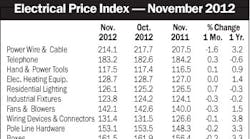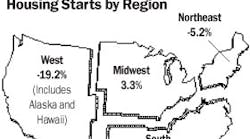Latest from Mag
People - Dec 21, 2012
Obituaries - Dec 21, 2012
November EPI Index Shows No Change
Housing Starts Dip 4% in November
Electrical Marketing - December 21, 2012
Around the Industry - Dec 21, 2012
Unusually snowy conditions in the Midwest and Northeast contributed to a 9.2 percent decline in sales of newly built single-family homes in January, but demand in the nation’s housing market remains solid, said the National Association of Home Builders (NAHB) following the home sales report from the Commerce Department.
“It’s important to avoid a knee-jerk reaction to today’s report,” said NAHB President Dave Wilson, a custom home builder from Ketchum, Idaho. “The fact is that weather was a major factor in the decline, with unusually harsh winter conditions contributing to a 40 percent drop in the Midwest alone. Our latest builder surveys indicate that the fundamentals of the nation’s housing market remain very solid.”
“The January decline is from a December number that Commerce revised upward by 11 percent since its last report,” noted NAHB Chief Economist David Seiders. “On balance, the housing market is still definitely in good shape — our latest builder surveys, continuing low mortgage rates and solid growth in employment and household income all bode well for builders in the months ahead.”
Last year’s record-breaking home sales now stand at 1.2 million, an all-time record that’s 10.5 percent ahead of the previous record set in 2003.
On a national basis, new-home sales fell from December’s seasonally adjusted annual pace of 1.22 million units to a seasonally adjusted annual rate of 1.11 million units in January.
Regionally, snowy weather in the Midwest contributed to a dramatic 40.3 percent decline in home sales there during January. The Northeast also felt the pinch of wet and snowy conditions, posting a 17.1 percent decline from December, while the South posted the smallest decline, of 3.3 percent, and the West actually gained 5.6 percent.
Meanwhile, the number of unsold new units on the market in January climbed 3.5 percent to 438,000 or a 4.7-month supply at the current sales pace. “A good portion of the units reflected in this inventory have been permitted but not yet started,” noted Seiders.
“The bottom line is that supply and demand in the new-home market are well balanced, and we’re only looking for a modest setback of between 3 and 4 percent for home sales this year as the interest rate structure gravitates upward. This housing market still has plenty of strength going forward,” he said.

